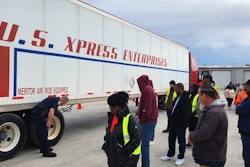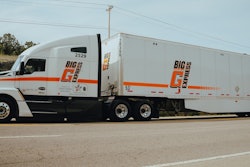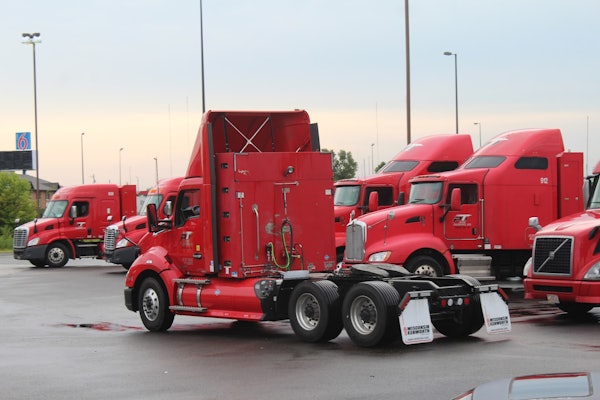Less than a decade ago Swift Transportation, Knight Transportation, AAA Cooper and U.S. Xpress were individual companies, and each were among the top 50 for hire-carriers on CCJ's Top 250 rankings.
Trucking giants Swift Transportation (then no. 4) and Knight (then no. 24) in 2017 announced they would merge. Four years later the now-combined Knight-Swift acquired Dothan, Alabama-based less-than-truckload carrier AAA Cooper Transportation (no. 49), and this week said it plans to acquire Chattanooga truckload rival U.S. Xpress (no. 19).
Among the many comments posted on CCJ's social media pages from readers of Monday's news centered around Knight-Swift's growth – already among the largest truckload carriers in the country – and that ingesting Chattanooga-based U.S. Xpress would create a truckload monopoly.
In its most basic sense, the Federal Trade Commission defines a monopoly as a market structure that favors a single company, with its goods and/or services dominating the market at all times. While Knight-Swift and its soon-to-be 25,000 truckload tractors will be a giant of the highways, it makes up only a fraction – less than 1% – of the more than 4 million Class 8 trucks registered in the U.S.
"There is near zero – and I mean close to absolute zero – chance this deal would be stopped due to monopoly concerns," said Jason Miller, associate professor of supply chain management and interim chair of the Department of Supply Chain Management at Michigan State University's Broad College of Business.
While the carrier that comes through the other side once the deal closes later this year will be of significant size, Donald Broughton, managing partner and principal at Broughton Capital, LLC, said the Knight-Swift-U.S. Xpress conglomerate still wouldn't be big enough to dictate market pricing, "and therefore it fails one of the foremost basic tests of 'Is this approaching monopolistic?'" In its most basic sense, the Federal Trade Commission defines a monopoly as a market structure that favors a single company, with its goods and/or services dominating the market at all times. While the Knight-Swift and its soon-to-be 25,000 truckload tractors will be a giant of the highways, it makes up only a fraction – less than 1% – of the more than 4 million Class 8 trucks registered in the U.S.
In its most basic sense, the Federal Trade Commission defines a monopoly as a market structure that favors a single company, with its goods and/or services dominating the market at all times. While the Knight-Swift and its soon-to-be 25,000 truckload tractors will be a giant of the highways, it makes up only a fraction – less than 1% – of the more than 4 million Class 8 trucks registered in the U.S.
Spencer Tenney, president & CEO of Tenney Group, a mergers and acquisitions firm that works with business owners in the 3PL, trucking and bus industry, noted the Kinght-Swift/U.S. Xpress deal would affect the competitive landscape, "but competition would still remain very meaningful," he said. "It would not allow Knight-Swift to dictate pricing and conditions. That alone makes characterizing this possible transaction as a potential monopoly a serious stretch from my vantage point."
In seeking to understand whether a monopoly exists, the Securities and Exchange Commission examines data from the Census Bureau's Economic Census, which is conducted every five years in years ending in 2 and 7 (the 2022 Economic Census is currently underway), Miller said. As of 2017, there were 31,908 general freight, long-distance truckload firms (North American Industry Classification System code 484121). The top four carriers accounted for just 15.4% of revenue, "and the top 50 are just 39% of revenue," Miller added, "which is very low compared to most industries. As such, there is no way a monopoly claim would hold."
That trucking serves multiple segments and industries, each in different geographies with different customers, Peter Stefanovich, president of supply chain merger and acquisitions experts Left Lane Associates, said it's unrealistic to think regulators would kill the deal on the grounds of it creating a monopoly. "There are over a million carriers throughout the U.S.A. of various sizes," he said, "and it's hard to argue there aren’t options out there."
"The industry is still fragmented and we are a long way away from a firm gaining an unfair, dominant position in the market," agreed Tim Kraft, associate professor of operations and supply chain management at the Poole College of Management at North Carolina State University. "Instead, my two takeaways from the merger are: it’s a great opportunity to achieve economies of scale and strengthen their coverage for Knight-Swift; and I think we will continue to see consolidation in the industry. The pandemic demonstrated how critical the trucking industry is to the economy and really reshaped how the industry is viewed – it's a bigger input into companies' strategic thinking now. It's also hurt a number of smaller providers. Building super-sized carriers with real scale and leverage could dramatically reshape supply chains."












